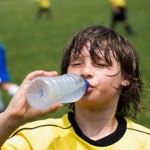 It seems the dog days of summer have arrived early, very early, in Southern Ontario and the Eastern United States – good time for a reminder about proper hydration from the Dietitians of Canada:
It seems the dog days of summer have arrived early, very early, in Southern Ontario and the Eastern United States – good time for a reminder about proper hydration from the Dietitians of Canada:
Adults need about 2-3 litres or 9-12 cups of fluid every day for healthy living. If you are active, you need extra fluid to replace the fluid lost through sweating. Check this site sideeffects.com
When you exercise sweating helps to cool the body. If you sweat a lot and do not drink enough you will get dehydrated. Dehydration can leave you feeling overheated and tired. Dehydration can also cause your performance to suffer. Common signs of dehydration are:
- thirst
- dizziness
- tiredness
- nausea
- chills
- headache
- muscle cramps
Severe dehydration is dangerous if not treated quickly. It is important to drink before, during and after exercise to prevent dehydration. This fact sheet will help you understand how much to drink and when to drink to support your active lifestyle.
Steps you can take
To keep you hydrated during your sports activities:
- Stay well hydrated by drinking before, during and after exercise to replace your sweat losses. If you exercise for less than 1 hour at a time, water is usually your best choice. Table 1 provides a fluid guide to help prevent dehydration.
- Check the colour of your urine to see if you are dehydrated:
- Plenty of pale yellow (e.g. lemonade colour) urine is a sign you are well hydrated
- A small amount of dark yellow (e.g. apple juice colour) urine could mean that you are dehydrated
Table I: Fluid Schedule before, during and after exercise
Fluid needs vary depending on the person, the type of activity that you do and the length of time that you are active. The following table provides general tips. Individual needs will vary. For more specific information see a dietitian who specializes in sport nutrition.
| Timing | Quantity | Type of Beverage |
| 4 hours or less before exercise | Drink about 1-2 cups of fluid (250-500 mL). | Water is usually your best choice. |
| 2 hours or less before exercise | Drink about ½ – 1 ½ cup (125-375 mL) of fluid if you have not produced any urine or only a small amount of bright yellow urine. | Water is usually your best choice. |
| During exercise |
Keep fluid with you when you exercise.
Sip it during your workout. Drink enough to replace water lost through sweat. |
Water is usually your best choice.
Sports drinks are a good choice when exercising for over 1 hour or in other special circumstances. (see sports drink section) |
|
Immediately
after exercise
|
If you drank enough during your exercise let your thirst guide you over the rest of the day.Eat your regular meals and healthy snacks over the day. | Water continues to be a good choice but you can also include:
|
Fluids to AVOID during exercise:
- Carbonated soft drinks, regular fruit juice, fruit drinks, lemonade
- Energy drinks that contain a lot of sugar or caffeine
Sports drinks are better than plain water when:
- the exercise is intense (e.g. when playing soccer, hockey, basketball or interval training)
- the activity lasts longer than 1 hour
- you sweat a lot and notice cakey white salt lines on your clothes
- you wear a lot of protective equipment like in hockey or football
- the weather is hot and humid
- your fluid needs to be quickly replaced (e.g. during soccer tournaments or two-a-day training sessions)
Sports drinks provide:
- Fluids to cool down your body and replace what you lost
- Carbohydrates for quick energy
- Sodium and potassium which are minerals lost in sweat
What to look for in a sports drink:
- No carbonation or ‘fizz’
- Carbohydrates: 40-80 g/litre from different sources such as glucose, sucrose, fructose and/or maltodextrin
- Sodium: 300-700 mg/litre (or at least 70 mg/250 ml)
A good sports drink does not need to include added amino acids, oxygen or herbal ingredients.
Special Considerations
If you are training for a marathon or triathlon, are involved with other endurance or high intensity sports, are involved with a team sport or wear a lot of sports equipment your fluid requirements may be different. Speak with a dietitian to get more detailed information on what your fluid requirement may be.
Elderly, pregnant and lactating women are at higher risk for dehydration and should ensure that they remain well hydrated when exercising.
Avoid muscle cramps by drinking enough fluids and getting enough sodium/salt in the diet. Try using a sports drink if you exercise for longer than 1 hour and if you sweat a lot.
Hyponatremia is a dangerous condition where the sodium in the blood falls too low. It may be caused by “over-drinking” (called hyperhydration) during sports events such as a marathon or triathlon. Signs of hyponatremia include weight/fluid gain (you may find your rings feel tight or fingers look swollen), mental confusion or general weakness. It can lead to seizure, coma, even death.
